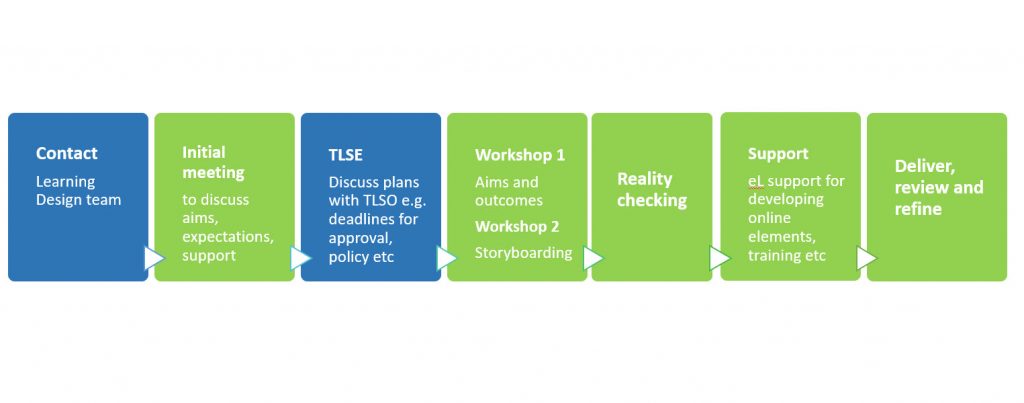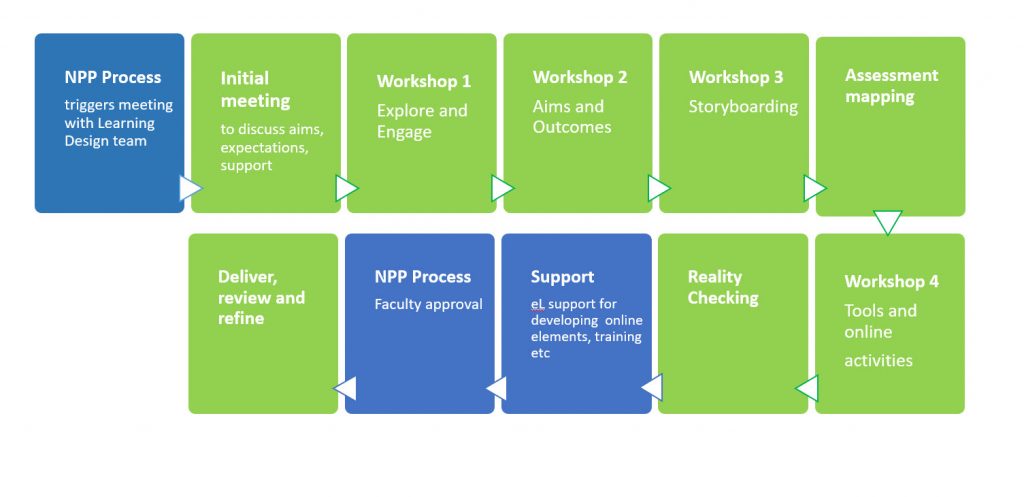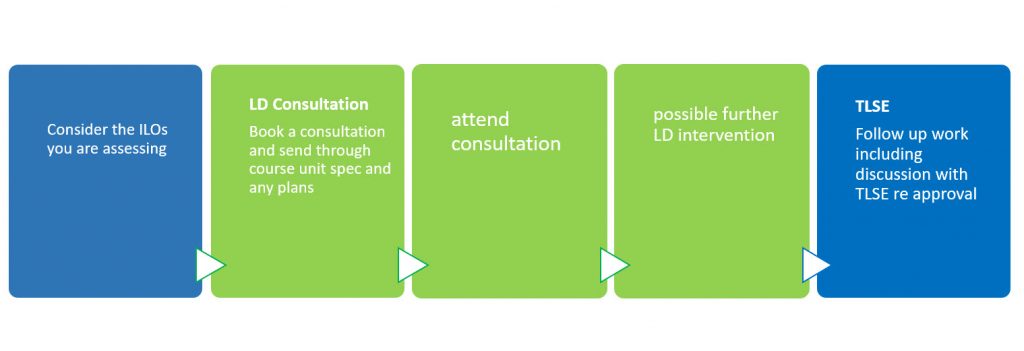Learning Design Case Studies
The Learning Design team have supported a number of units and programmes across the faculty including:
- SOCY10452 (Media Revolutions)
- MA International Law
- EDUC66091 (Teaching and Learning with Technology)
- EDUC20261 (The Applied Study Period & Employability)
- LLB Programme (LLB Law)
- LD Consultations (Learning Design consultations)
The following case studies highlight how the HeLD (Humanities eLearning Design) process has benefitted specific course units and programmes within the Faculty of Humanities.
The Humanities Learning Design team have received positive feedback from staff for the HeLD consultations and our Learning Design approach.
“I would highly recommend these workshops to my colleagues, and look forward to implementing the changes to the course with my colleagues. I have also found the workshops useful with regard to other courses I teach and will be able to transfer some ideas to these”
“I have found a new attitude and approach to the whole idea and am keen to try it out now”
“I was impressed by the breadth of coverage, the process and potential outcomes”
“It was like going into the unknown – I wasn’t sure what to expect from the process before we started. I have found lots of elements from it very helpful though.”
“It has helped me to view aspects of teaching and learning in a different light and see things which are already there but not utilised fully or as well as they could be, in addition to helping me design and think about new activities both online and face to face.”
“I will make the blended learning elements a part of my planning for the classes at the first stages and through-out the courses. I have found a new attitude and approach to the whole idea and am keen to try it out now.”
“I especially liked the format of the sessions, i.e. tailor made for my needs, and I was extremely impressed with the skills of the facilitators and how much they put into it. I felt very supported and listened to. I found the exchange on the subject of blended learning in general especially useful, rather than just learning new technical skills.”
EDUC20261 Careers Management (Unit Level Development)

EDUC20261 – Example Approach
Drivers for change: The unit lead wanted to further develop students professional skills whilst also managing a reduction in credits for the unit. A flipped approach was used for the unit to enable students to work individually in an asynchronous mode, and come together for more active workshops.
Process: The unit lead worked closely with the eLearning team to focus on aims and learning outcomes. In-depth storyboards for the whole unit were developed by the unit lead and translated into blended/flipped activities for the students.
LLB law (Programme Level Development)

Example Approach – LLB Law
Drivers for change: Changes to external accreditation and the outcomes of an internal review have led to a full redesign of the LLB programme.
Process: This was a large scale project involving new units, unit amendments and changes to the programme aims and outcomes. The programme team worked closely with the eLearning team to develop teaching and learning approaches via Explore and Engage workshops (to elicit key themes, aims and outcomes from staff, students and alumni), mapping of programme and unit ILOs, assessment mapping, unit development and online activity development.
EDUC66091 Teaching & Learning with Technology

Example Approach – EDUC66091
Drivers for change: Unit convenors wanted to improve assessment information for participants on this PGCert unit. The unit has a 3 part assessment and what was expected in each element was not always clear to the participants.
Process: One of the convenors used the HeLD approach and principles of constructive alignment to develop clear assessment criteria mapped to the unit ILOs. A rubric was developed providing information to participants on what was expected in each submission element, and the different levels of achievement. This is made available to participants from early on in the unit. An additional assessment criteria document was provided to participants showing which ILOs are assessed in each element.
Impact: Participants now have clearer information, causing less confusion and saving time for the unit convenors. Additional benefits are that the rubric has made the marking process simpler and more efficient, and as the unit is team taught and marked there is now less opportunity for discrepancies between markers.
Urban Studies Programme
Caitlin has been leading up the development of the Urban Studies Programme along with Kevin Ward, Cecilia Wong and Deljana Iossifova. They are designing an interdisciplinary programme that’s delivered by staff across SEED, but also across the Faculty.
Here are some of Caitlin’s reflections on the programme design elements and the module design elements and how it’s been to work with learning development team, which, in her words, has been a really very positive experience.
Programme design
- It can be overwhelming to design a new programme, and often totally confusing – working with the learning design team has made it easier, more fun, and collaborative, as well as helping to demystify the process of creating a new programme.
- It’s also fun to work with people who are excited about your ideas and want to help you make them work.
- Learning design provided Programme level oversight – it can be really challenging to see the forest for the trees, so having the team be able to give you that overview and see how your program aims and ILOs fit with the unit level ILOs is really, really helpful in seeing where things complement each other and where there are redundancies.
- We had lots of ideas – learning design helps you think through operationalising them and also figure out what the pedagogic value is.
- Be imaginative! Try out new cool exciting things now! You can always reign it back in, and add stuff in later years of the programme, but think about adventurous things you can do
- Figure out the gaps and how you can fill them creatively and not be redundant.
- Learning Design ensured we were making progress and helped us see other issues/questions we needed to discuss; they set up meetings to keep ticking along.
- It’s helpful to have all of the conveners of core/compulsory units participating – then you have a clear sense of who is leading what units and why before you enter the process, and can think as a group how you can work together and complement each other and work together smarter.
- Come to the meetings prepared and also meet outside of the set meetings – that helps to be better prepared for those meetings and also give the opportunity to have additional discussions that were generated at those meetings or in anticipation of those meetings.
Module design
- Learning Design provided an infrastructure for us to get the program going in terms of modules. We know a lot about teaching, think about it a lot, have experience, and have designed lots of modules…but have never really had proper training! So this felt really special and what we should be doing for all modules that we teach.
- Very helpful to have someone who understands and justifies pedagogic decisions – but is also mindful of workload! This is especially true speaking as a convener of a co-taught unit. The process helped us navigate and mediate those discussions with people who have very different ideas, all teaching on the same module.
- Do your homework – do the prep for each meeting. Go in and do the prep work that you’re assigned. It’s not a lot, but it’s really helpful.
- And it’s helpful to go in with an idea of what you want to do. Spend some time with your big teaching team for the whole program or with yourself, thinking about what you want to achieve in the units and overall in the program before you start the process. But also be flexible – don’t be precious.

School: School of Environment, Education and Development (SEED) and School of Social Sciences (SOSS)
Discipline: Education, Law, Urban Studies
Academic: Various
Courses:
- SOCY10452 (Media Revolutions)
- MA International Law
- EDUC66091 (Teaching and Learning with Technology)
- EDUC20261 (The Applied Study Period & Employability)
- LLB Programme (LLB Law)
Cohort Size: various
Ref: 076

0 Comments